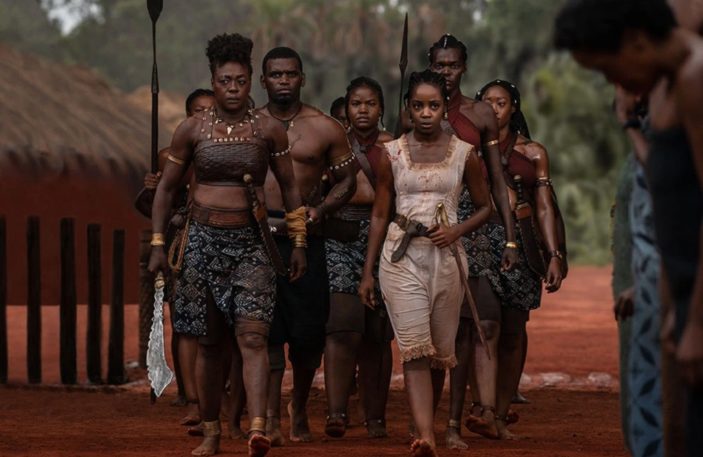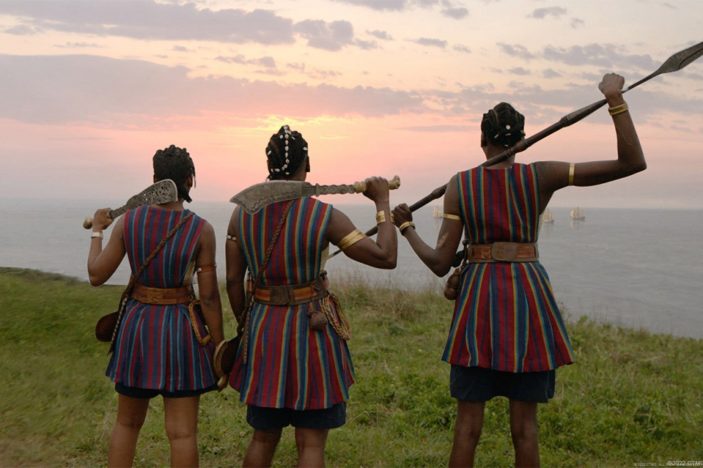
The Woman King is the remarkable story of the Agojie, the all-female unit of warriors who protected the African Kingdom of Dahomey in the 1800s with skills and a fierceness unlike anything the world has ever seen. Inspired by true events, the film follows the emotionally epic journey of General Nanisca (Viola Davis) as she trains the next generation of recruits and readies them for battle against an enemy determined to destroy their way of life.
As the film charges into Australian theatres (you can read our review here), Viola and emerging co-star Thuso Mbedu spoke with Peter Gray ahead of the film’s world premiere at the Toronto Film Festival to discuss the film’s impact, both historically and in moving the stories of women of colour forward in Hollywood, and the brutality behind the epic action sequences.
Viola, you’ve described this film as your magnum opus. I know Hollywood seems very scared of change, so I can imagine this film could have been quite terrifying to produce. Was it difficult to get this off the ground?
Viola Davis: Yeah, but it’s difficult for everyone to get anything off the ground in Hollywood. You know, people see the inception of the film they see on the screen. They don’t see the middle, the process of going in rooms, of fighting for actors, of fight for the director, of fighting for the budget. (It’s) fight, fight, fight, every single day. So this film took seven years. But as you saw on the screen with these performances, with all these beautiful actresses, how (it was) totally worth it.
You know, someone said to me “What other people think of you is none of your business!” A totally black female led film would terrify Hollywood. But that’s none of my business. It doesn’t terrify me. It looks right. It looks like my life, the way it’s always looked. It’s something that I always knew we were capable of, and so I understand from now until God takes me from this life (that) that’s my narrative. I’m not as concerned with how other people see (my) journey. How difficult it is (or) how hard it is. I know that I have a great gift. We have a great gift to give to them.
As a film that’s both political and entertaining, how do you see this impacting the younger generation? Especially women?
Viola Davis: I think anything that you can leave behind for the next generation, to make a clear path – not an easy one, but a clear one – is worth it. You have to understand that our lives as women, and our lives as black women, is fraught with so many obstacles. I understand everybody has it hard, but there are obstacles in our path that I wish weren’t there when I was younger. I’m going to use the big R word – responsibility. It’s our responsibility to make a clear path, so at some point we can see the world as it should be. The way it should have been from the very beginning.
Thuso Mbedu: For me, you know, one of the reasons why I chose to be in this industry is why I believe I can use this gift to bring about some change and impact. But also recognising that we are in the business of entertainment, so if we’re able to bring about change and make an impact through entertainment, then we have served our purpose. (The Woman King) is not a documentary, but we are speaking on things that are necessary for the now, so if people can enjoy it while taking home a good message, then (we’ve done our job).

This film is quite progressive in its social structure of such a dominant culture. There’s gender parity, and an entire female warrior unit…
Viola Davis: I think that what was the Dahomey Kingdom was looking for – autonomy and agency. To be in control of their own destiny. To be completely self sufficient. That was so magnificent. I’ve always said that I don’t think people change. Times change, but people don’t. What we want at our core is ownership, and I think that if we were to reach back in time I think that there were a lot of progressive and liberated people. I think especially in Africa there was more of a matriarchal sort of female. We just don’t tell those stories. I think as you dig into the vast African history you would see more of those structures and more of those kingdoms. It blows my mind because I’ve always been told that, as an African American, that doesn’t exist, and so I believed that. This is a completely self sufficient culture. it’s not a surprise, it’s just never been told. Man, was my world blown open.
The physical aspect of this film is incredible. There appears to be a complete lack of CGI and everything on screen looks so real and painful. How was that experience?
Thuso Mbedu: It looks real and painful because it was? (Laughs). I was told very early on in my audition process that we would be doing our own stunts. I had to undergo physical fitness tests (so) our stunt coordinator could determine whether I’d be able to maintain a stance or not. We were pushed to our absolute limits. And then we got to the limits, and we were pushed even further. It was hard, but amazing. And (then) seeing it on screen is absolutely mind-blowing. I’ve always wanted to do action, and I didn’t know if I had it in me to do it or what it would take for me to do it. We had weapons training, martial arts, training with the spear, the machete. Running, sprinting…I know Viola would even train in the mornings before shooting. I would run and hide (laughs), no, but anything I was going through I knew was nothing compared to what these women went through.
Viola Davis: I was the old warrior, so I absolutely thought I was gonna die. The fact that I am alive and speaking to you today is a testament to Gabriella McClain (strength trainer). I said I wasn’t going to make it, I have all kinds of things going on right now (laughs), but I’ll tell you, when I broke the barrier, that great wall, oh my God the satisfaction of knowing you could do it! I’ll tell you about one scene in the movie, I told (Thuso) to run and all I saw, you know it’s like that character of Jack in The Incredibles, was this blur run past me, and I’m supposed to run behind her? I was like “Cut, cut!” I told her to slow down. I am running beside this extraordinary actress and she absolutely mastered the art of sprinting. (She) tapped into that brutality.
The Woman King is now screening in Australian theatres.
